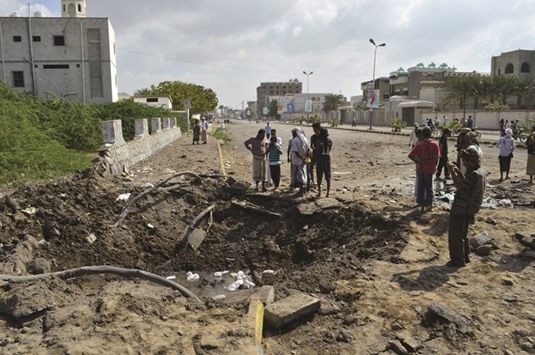Yemen’s pro-rebel ex-president Ali Abdullah Saleh has rejected further peace talks with the government, saying dialogue should instead take place with Saudi Arabia.
Riyadh has been leading a military campaign since March against Iran-backed Shia Houthi rebels, who have also been supported by Saleh loyalists.
In a speech late Sunday during a meeting with members of his General People’s Congress (GPC) party, UN-sanctioned Saleh said “we will not take part in (future) dialogue... unless the war ends.”
GPC representatives attended UN-sponsored peace talks in Switzerland last week. There was no major breakthrough in the talks but the parties agreed to meet again on January 14.
“And if the war ends, we will hold talks with Saudi Arabia and not with the delegate of escapees,” he said, in reference to the delegation of President Abd-Rabbu Mansour Hadi’s internationally recognised government, which was forced into months of exile before returning in September to main southern city Aden.
A ceasefire began as the talks opened in Switzerland but was violated daily.
The conflict in Yemen has killed more than 5,800 people since the Saudi-led intervention began in March, according to UN figures.
Saleh ruled Yemen for three decades and maintained good ties with Saudi Arabia before resigning in 2012 following a popular uprising against his rule.
In the speech he offered to “co-operate” with the Houthis to convince them to hold talks with the kingdom.
Meanwhile, relief groups in Yemen’s third city Taez said yesterday that humanitarian aid was not reaching the provincial capital under rebel siege.
“No aid has arrived in the besieged city,” a member of a local medical relief committee said.
“We heard there is aid entering areas outside the city... controlled by those besieging us,” Mohamed al-Qobati said.
The World Health Organisation said last week it had managed to deliver more than 100 tonnes of medical aid in Taez province to benefit more than a third of “3mn people... in dire need of humanitarian assistance”.
But the delivery of 22 tonnes of medical aid to five health facilities in Taez city was “on hold due to access issues,” it said.
“There is a lack of medicine and oxygen cylinders,” Qobati said. “Taez is living a real catastrophe.”
The southwestern city’s largest hospital, Al-Thawra, closed on Friday after running out of medical supplies and surgical equipment.
Its 600,000 residents are in desperate need and many have taken to treacherous mountain paths to bring in essential goods.
They have been caught in the crossfire between loyalists to Hadi who are defending their positions in Taez and Huthi rebels who have encircled them.

People gather around a crater caused by a Saudi-led air strike in Yemen’s Red Sea port city of Houdieda yesterday.
